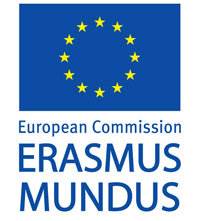
University of Barcelona (Spain)
Dr. Marc Ruiz-Zorrilla Cruzate
Gran Via de les Corts Catalanes, 585
E-08007 Barcelona
34-93-4034699
m.ruizzorrilla@ub.edu
http://www.ub.edu/web/ub/en
Second Coordinator:
Saint Petersburg State University (Russia)
University of Glasgow (UK)
Friedrich Schiller University of Jena (Germany)
University of Duisburg-Essen (Germany)
University of Barcelona (Spain)
Polytechnical University of Catalonia (Spain)
University of Granada (Spain)
University of Siena (Italy)
Radboud University Nijmegen (Netherlands)
Jagiellonian University in Krakow (Poland)
Slovak University of Agriculture in Nitra (Slovakia)
University of Poitiers (France)
Moscow State Linguistic University (Russia)
Lomonosov Moscow State University (Russia)
N.I.Lobachevsky State University of Nizhni Novgorod (Russia)
Pskov State Pedagogical University (Russia)
Russian State Hydrometeorological University (Russia)
Saint Petersburg State University (Russia)
South Ural State University (Russia)
Yaroslavl Demidov State University (Russia)
Julia Panko
Head of the International Projects Office
Centre for Fellowship Support
Siberian Federal University
82 А Svobodny prospect, office 224 – 5
tel.: +7 (391) 206 26 97, fax: +7 (391) 206 26 98
e-mail: JPanko@sfu-kras.ru
The ERANET-MUNDUS project aims to establish strong ties and mobility flows between Russian and European universities. The principal objectives are:
- To forge links between Russian HEIs and the broader academic system to the European Higher Education Area, providing institutions, academics, researchers and students with experience of the European model and guidance on how to develop standards.
- To construct a stable and ongoing mobility scheme between Europe and Russia and to establish a solid framework for future collaborations.
- To meet the disciplinary requirements of Russia and Europe as a whole, acquiring experience in interdisciplinary research areas such as Natural Sciences, Geography and Geology, Economic and Social Sciences, Culture, Language and Philology, and Engineering and Technology.
- To widen and strengthen the international cooperation in civil rights and citizenship, sustainable development and safety based on an environmental-economy and a more ecological society.
- To promote awareness of the importance of cultural and linguistic diversity guarantying the promotion of intercultural education.
- To train new generations of teachers and professors, helping existing regional and federal lifelong learning structures to train teachers with a wide range of languages and broader cultural awareness.
ERANET-MUNDUS project wishes to promote a flexible mobility scheme focusing primarily on the demand for specific subject areas. As a result, all fields of study are covered:
(1) Agriculture Sciences; (2) Architecture, Urban and Regional Planning; (3) Art and Design; (4) Business Studies, Management Science; (5) Education, Teacher Training; (6) Engineering, Technology; (7) Geography, Geology; (8) Humanities; (9) Languages and Philology; (10) Law; (11) Mathematics, Informatics; (12) Medical Sciences; (13) Natural Sciences; (14) Social Sciences; (15) Communication and Information Science; (16) Other areas of study.
Apart from that, each institution participates in the project offering a range of courses generally available to their students, not only English language courses. The diversity of languages, areas of study and cultures covered is the cornerstone of this project, as it provides a great degree of added value to the academic involvement of candidates.
ERANET Plus strategies aim to establish and develop student (all levels) and faculty exchange between Russian and European universities through mutual mobility agreements. They aim to develop research programmes (various study fields), acknowledge the procedures of degree recognition and match credits for future cooperation. They also aim to improve European and Russian language programmes in European and Russian universities.

 Siberian Federal University
Siberian Federal University 
